
Last week 451 Newcastle residents wrote to thee councillors representing the part of Newcastle in which they live. They asked that the planning committee reject Banks Group's application to extract coal by opencast at Dewley Hill on the western outskirts of the city. A copy of the letter addressed to all councillors together is below.
The planning hearing will take place on Friday the 18th December. For details see this page.
Re. Application to mine coal and fire clay at Dewley Hill, Application Number 2019/0300/01/DET
Dear Newcastle Councillors,
We, the undersigned are writing to you, our local representatives, to explain our objection to a planning application to extract coal and fireclay by opencast from Dewley Hill, North of Throckley.
Banks Group and Ibstock brick seeks to extract 800,000 tonnes of coal and 400,000 tonnes of fireclay from 112 hectares of Newcastle's greenbelt at Dewley Hill, which sits to the North of the A69 near Throckley. Here is a video (https://vimeo.com/455806042) where local residents explain why this land is so important to them, and what it would mean to have an opencast here.
Many of us have already written to the planning department, joining over an estimated 5,000 individual objections, and over 18,950 petition signatories in asking for this application to be rejected. In September 2020, the Secretary of State for Housing Communities and Local Government, Robert Jenrick, rejected an application by the same company to extract 2.765 million tonnes of coal by opencast, from Highthorn just inland of Druridge Bay.
Implications from the rejection of Highthorn opencast
The decision to reject the application at Highthorn is significant as the main grounds for rejection also apply to this application. The Highthorn application failed to meet the National Planning Policy Framework, paragraph 211. The application to opencast at Dewley Hill doesn't meet this framework either.
“211. Planning permission should not be granted for the extraction of coal unless:
a) the proposal is environmentally acceptable, or can be made so by planning conditions or obligations; or
b) if it is not environmentally acceptable, then it provides national, local or community benefits which clearly outweigh its likely impacts (taking all relevant matters into account, including any residual environmental impacts).”
A new opencast coal mine on greenbelt of Newcastle is not environmentally acceptable, would harm local wildlife, pollute the Ouse and Dewley Burns and, in combination with the air pollution from the A69, would negatively impact our health.
At Highthorn, Banks Group failed to show that there was sufficient need for coal for industry and the Secretary of State felt that Banks Group's assertion of ongoing non-power station demand was overstated. The same applies here. The Digest of United Kingdom Energy Statistics 2020 says that in 2019 of all coal types demand was “down by 36 per cent compared to 2018.”1
Banks claim that coal from the Dewley Hill site would be used by industry, yet fails to declare its industrial customers buying coal from its other opencast mines. Tata Steel is investigating alternative ways to produce steel than using coal, so its non-binding support does not demonstrate a market for the coal. Therefore, the preconceived national, local or community benefits do not outweigh the harm.2
In July, Durham County Councillors rejected Banks Group's application to extend the Bradley opencast coal mine contrary to the Planning Officer's recommendation. The Councillors were concerned that increased coal availability would reduce the drive to low carbon steel production.
Increased coal supply increases coal use
If the application to extract coal at Dewley Hill were to be approved, it would result in additional coal available for consumption. Extracting coal from a new site would not substitute for coal mined elsewhere, it would add to it.3 Overall there would be an increase in greenhouse gas emissions. The reality is that the vast majority of greenhouse gases released from the full lifecycle of coal come from the final use of the coal. Emissions from transport is a minor consideration.
At present Banks Group is not extracting coal anywhere. The four operational opencast coal mines in the UK will soon close or have an uncertain future. There are no other proposals to open new opencast coal mines in the UK, there simply isn't the demand for UK coal.
The Government has committed to reducing carbon emissions to zero by 2050, to reach this heavy industry must decarbonise fast. Supplying additional coal to the market delays and stunts investment in low carbon technologies. The biggest single emitter of carbon dioxide in the UK is Tata Steel's Port Talbot steelworks,4 which is looking to convert to recycle scrap steel5 leaving just one company making steel using coal, this demonstrates industry desire to move away from coal.
Planning policies
In addition to paragraph 211 of the National Planning Policy Framework (NPPF) the following policies also need to be considered which this application contravenes:
Paragraph 11d of the NPPF as the adverse impacts of granting planning permission would significantly and demonstrably outweigh the benefits specifically in respect of adverse landscape, visual and residential amenity impacts.
Policy DM32 point 1 of the Newcastle Development and Allocations plan (DAP) states that mineral operations will only be supported where it would be demonstrated that 16 considerations are mitigated against. Importantly this includes landscape character, air quality; surface and groundwater and drainage; and climate change, all of which are not properly mitigated against in this application. Applications on this site in 1990 and 1996 were turned down for these very reasons, including that it encroached on natural space and greenbelt land.
The proposed site lies in the Newcastle Green belt. As such policy CS19 of the Core Strategy and Urban Core Plan needs to be complied with. In the Development and Allocations plan, the land where the proposed application sits is allocated as Wildlife Enhancement Corridors and as such policies CS1 and CS19 must be considered.6
Finally, with the ongoing Covid-19 pandemic many people are spending far more time at home and are really appreciating outdoor access, which needs to be protected. This application offers nothing to the community. We need our green space now, as well as in the future.
Please join us in speaking out against this mine and discussing it with the Councillors on the planning committee.
Yours sincerely,
451 local residents whose names and postcodes were provided to the council
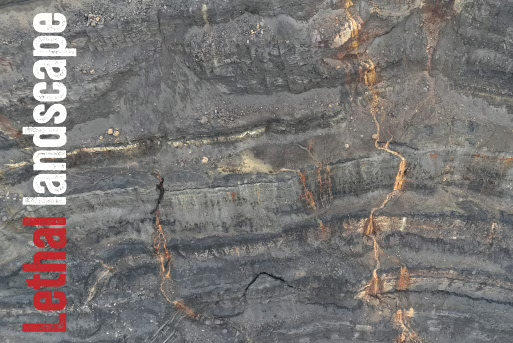
16 years of opencast coal mining in Ffos-y-fran has generated colossal overburden mounds, also known as slag heaps or coal tips. There are three coal tips, with the third being the largest, and cumulatively accounting for 37 million cubic metres of colliery spoil, rocks, and soil…
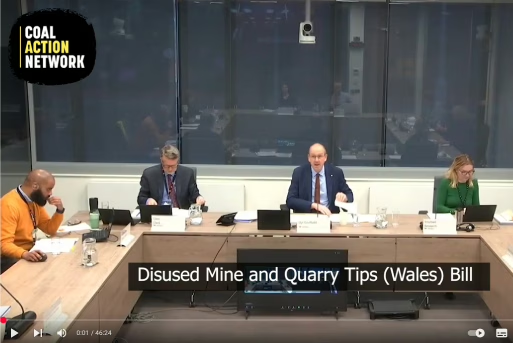
We were invited for the second time to give oral evidence to the Climate Change, Environment, and Infrastructure Committee of the Welsh Parliament (Senedd) on 05th February 2025. We shared the panel with Haf, Director of FOE Cymru, to provide our opinion on the weaknesses, strengths…
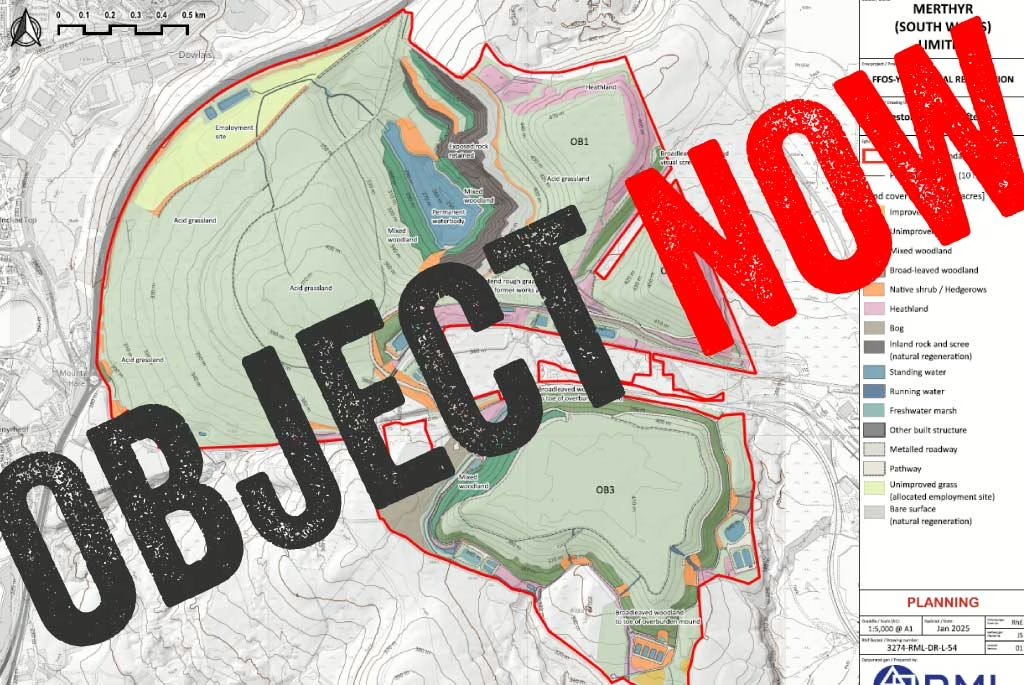
Merthyr (South Wales) Ltd mined for over a year illegally after planning permission for the Ffos-y-fran opencast coal mine ended in September 2022. During that year, it made record-breaking profits due to sanctions on Russia and other factors driving up the price of coal. But rather than using some of the profits from that ill-gotten coal…

MSW claims “It was established that there are insufficient funds available to achieve the 2015 restoration strategy and therefore an alternative scheme is required.” (EIA Scoping Report, July 2024)… To our knowledge, there has been no evidence submitted by MSW that it cannot fund the full restoration it is contracted to undertake…
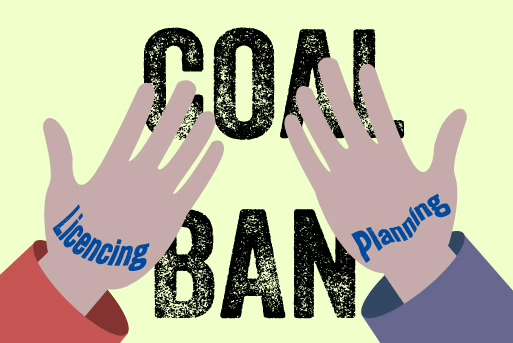
The UK Government launched a consultation on a limited review of the National Planning Policy Framework (NPPF) for 8 weeks from 30 July to 24 September 2024. The NPPF is an influential document that shapes planning decisions and priorities across England. It is periodically updated by the Government, following a public consultation…
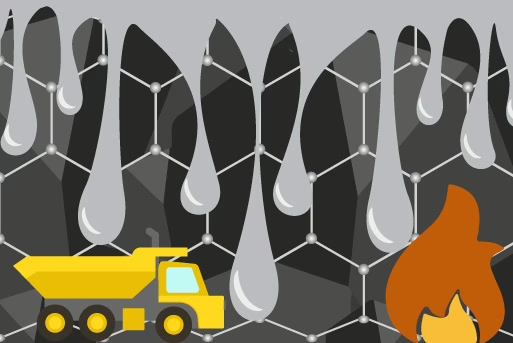
Bryn Bach Coal Ltd attempts to present the anthracite coal it wishes to extract from an expansion of Glan Lash as a unique and scarce commodity that is needed for water filtration, bricks, and graphite, and would therefore be too valuable to burn. Yet, visiting Energybuild Ltd’s…
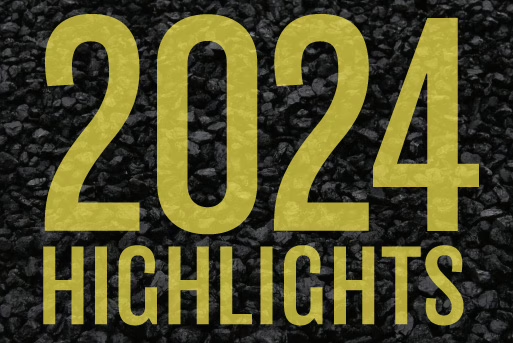
Over the past year, we’ve secured some massive victories. By taking part in our digital actions, supporters sent over 26,000 messages to the UK Government, MPs, Welsh Senedd members, Councillors, and companies to help consign coal to the history books in the UK…
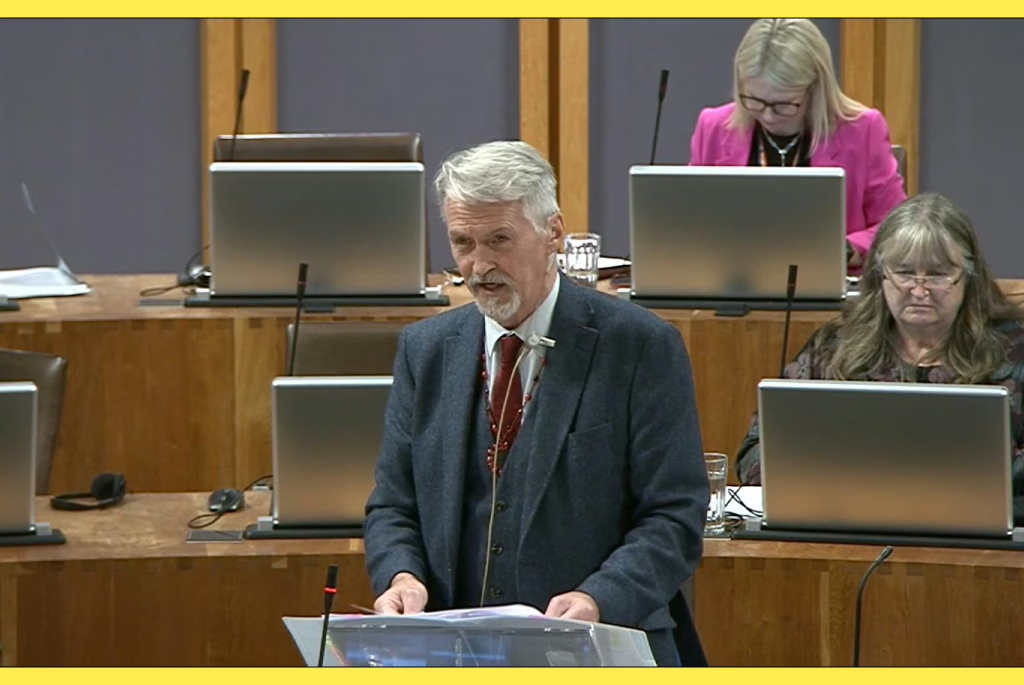
The Disused Mine and Quarry Tips (Wales) Bill (‘the Bill’) was prompted by a series of coal tip landslides that occurred in Wales following storms’ Ciara and Dennis in 2020, including a major landslide of a disused coal tip in Tylorstown…
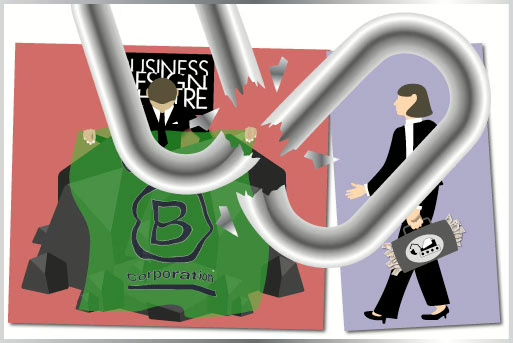
As B Labs doesn’t seem bothered was the public says, we asked supporters to contact other B Corps – who are effectively B Labs customers. Almost 20,000 emails were sent to over 60 B Corp status companies, asking them to take a stand with us…